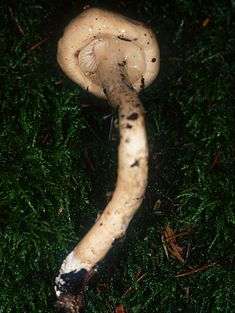Limacella illinita
Limacella illinita, or Overflowing Slimy Stem, is a mushroom in the genus Limacella, in the family Amanitaceae.
Description
- Cap : It has approximately 2–7 cm long radius. It is round becoming convex then wide or with a broad umbo, the margin hanging with slimy veil remnants. It is white or cream in color. It feels smooth and sticky or slimy.[2][3]
- Gills : They are free, non-waxy, close, broad and white in color.[2][3]
- Stem / Stipe : The 5–10 cm long stem tapers a bit towards the top. It is fleshy, soft and has a ring. White in color, it is also sticky and slimy.[2][3]
- Spores : Spores are globose to broadly ellipsoid and smooth.[2][3]
- Microscopic features : The spores measure 4.5-6.5 x 4-6 um.[2][3]
- Flesh : Flesh is slimy and sticky.[2][3]
- Fruiting : These mushrooms flower in between August or July and October or November.[2][3]
Distribution and habitat
L. illinita is widely distributed in North America and often found in Europe. These can habitat singly, scattered, or in groups in woods, swamps, fields, lawns, roadsides and sand dunes.
Bioactive compounds

The skeletal formula of muurolane.
A study in 2007 discovered four new bioactive compounds from basidiomycetes, isolated from fermentations of L. illinita: Illinitone A that exhibited weak phytotoxic and moderate nematicidal activities against Caenorhabditis elegans, Illinitone B that was moderately cytotoxic, Limacellone that exhibited weak cytotoxic and phytotoxic activities and muurolane sesquiterpene 4a that was found to be inactive in the assays performed there.[4]
References
- ↑ "Limacella illinita". Amanitaceae.org. Amanitaceae.org.
- 1 2 3 4 5 6 7 "Limacella illinita". Rogers Mushrooms. Archived from the original on 2011-11-07.
- 1 2 3 4 5 6 7 Bessette, Alan; Arleen Rainis Bessette; David William Fischer (1997). "Gilled Mushrooms". Mushrooms of northeastern North America. New York, United States: Syracuse University Press. p. 194. ISBN 0-8156-2707-6.
- ↑ Gruhn, Nina; Sylvia Schoettler; Olov Sterner; Timm Anke. "Biologically active metabolites from the basidiomycete Limacella illinita (Fr.) Murr.". Zeitschrift für Naturforschung C. Germany: Department of Biotechnology, University of Kaiserslautern. 62 (11-12): 808–812. ISSN 0939-5075. PMID 18274282.
This article is issued from
Wikipedia.
The text is licensed under Creative Commons - Attribution - Sharealike.
Additional terms may apply for the media files.
